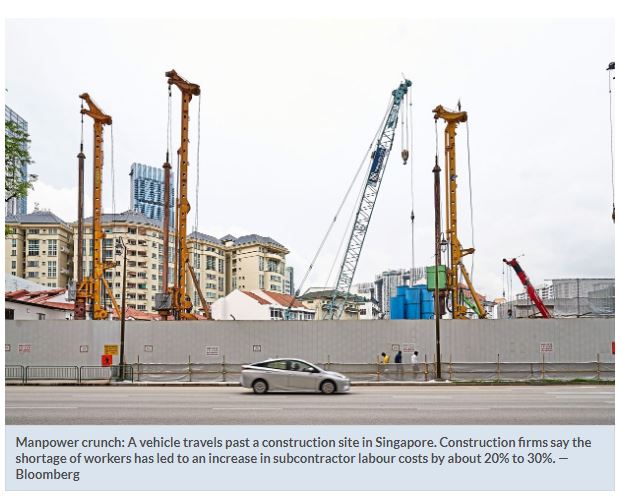Singapore foreign labour woes
SINGAPORE: With tighter border controls amid the coronavirus pandemic limiting the entry of new foreign workers into Singapore, sectors dependent on foreign labour are being squeezed more than before.
More than 10 employers in the construction and food and beverage (F&B) sectors told The Sunday Times that their manpower costs have gone up significantly in the past few months. While some have tried to adjust and adapt, challenges remain.
For example, there were about 420,000 people employed in the construction sector in September, based on preliminary estimates by the Ministry of Manpower (MoM).
It shrunk by about 17,100 compared with the quarter from April to June, with mostly foreign workers shed.
The pool of foreign labour in Singapore has shrunk this year. According to MoM data, the country’s total foreign workforce stood at 1,351,800 in June, compared with 1,427,500 last December.
Notably, the number of work permit holders in the construction, marine and process sectors dropped by more than 18,000 – or about 5% – over the same six months. This is largely due to repatriation of workers.
Teambuild Construction Group executive director Johnny Lim said about 5% to 8% of its foreign workers requested to return home over the past year.
Foreign staff account for 85% of the firm’s total strength of 1,000.
Straits Construction executive director Kenneth Loo pointed out that the shrinking pool of workers comes atop the shortage of labour that already existed before the circuit breaker earlier this year, given that construction output was originally projected to grow this year.
Construction firms said the shortage of workers has led to an increase in subcontractor labour costs by about 20% to 30%.
Loo said: “At the end of the day, demand exceeds supply. The pool of workers is finite, and those contractors which have more urgent needs will pay more.”
For some, like factory construction firm E+HPS, it is necessary to pass the rising labour costs on to customers in order for it to take on new projects, said its managing director Jeffrey Koh.
Labour shortage is also forcing some to be more conservative.
A subcontractor firm which declined to be identified as it does not want to alarm existing clients, said it has been holding back from taking on new projects as it has only about 60% of its workers as compared with January.
“We’re not at the stage where we’re thinking of shutting down, because we still have a few projects on hand, but if this situation continues and we cannot bring in new workers, it will be difficult for us to continue operating at the same level, ” its managing director said.
For the F&B sector, not being able to bring in new foreign workers to fill the gaps from natural workforce attrition is a concern.
They have turned their focus to Singaporeans, but this too is a challenge. About 1,000 vacancies in the sector remain unfilled, despite the soft labour market.
Singapore’s resident unemployment rate hit 4.7% in September, and there are about 112,500 unemployed Singaporeans and permanent residents – but few seem to be biting, where F&B jobs are concerned.
F&B players, such as restaurant groups Crystal Jade and The Cicheti Group, said local workers usually have higher expectations of job scope and pay.
“Money has never been an issue. The issue is finding a candidate who is committed and willing to make sacrifices, ” said Ronald Kamiyama, managing partner of The Cicheti Group.
The hiring situation is made more acute given that the dependency ratio ceiling for the services sector, which F&B falls under, will be reduced to 35% next year. It is currently 38%.
Andrew Tjioe, president and chief executive of Tung Lok Group, said the company is looking to hire Singaporeans, to address its manpower needs as business has picked up. The restaurant group, which has 26 outlets, laid off about 200 workers earlier this year, of whom 85% were foreigners.
“In the F&B industry, if you do not have enough staff, your food and service quality will go down, and that affects your business, your staff, everybody, ” Tjioe said, adding that the group may not renew the leases of at least two of its restaurants in the city centre when they expire over the next year.
“For some places, it makes no commercial sense to continue because the rent is too high, ” he said.
Still, the group continues to be on the hunt for new spaces, he added.
Dian Xiao Er founder Samuel Yik is among the F&B operators who have turned to central kitchen operations to reduce their manpower needs at restaurants.
“We do bulk processing of food products at the central kitchen, which reduces preparation time at the individual outlets, ” he said. — The Straits Times/ANN


 Thailand
Thailand




